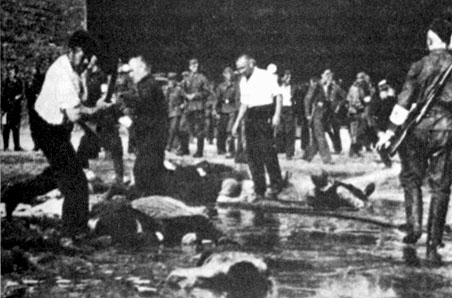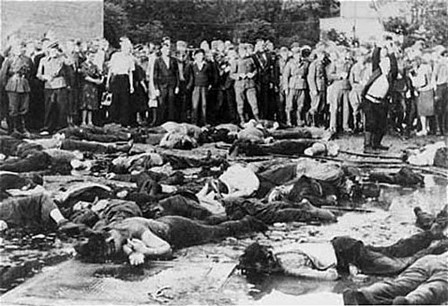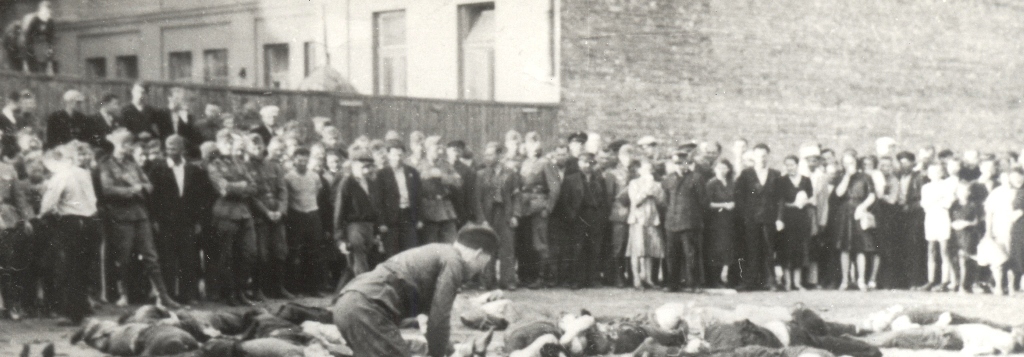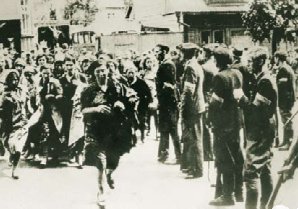is an upscale effort of the Holocaust Obfuscation movement that keeps far from open adulation of Nazis, public flaunting of swastikas, or neo-fascists parading on the capital’s main boulevard. Of course there are interconnections, as when members of parliament obtain the permit for the neo-nazis or march with them, or when courts sanctify swastikas as allegedly harmless ancient symbols of the nation, or when political leaders and academics profiting from Jewish studies fail to utter a word of concern on their websites But these interfaces are far from the core of ‘Perpetrator Dry-Clean’.
Information on the Campaign of Murder
By Collaborator Dry-Clean we refer to the sophisticated political and intellectual movement, duly pushed by ultranationalist politicians, academics and media, to sanitize, justify, recast or glorify infamous local Nazi collaborationist groups. What is particularly frightening is that its spokespersons often locally monopolise not only the field of ‘Holocaust Studies’, but even ‘Judaic studies’, to the point of obtaining funding from naive western and Jewish sources who have little idea what is happening on the ground in the local language and milieu.
The first major chapter in the post-Soviet period concerned rehabilitations of war criminals previously convicted for participation in the Holocaust. The establishment sponsored effort to dry-clean individual convicted Holocaust perpetrators, via state-issued rehabilitations accompanied by monetary rewards, was covered by the New York Times in the early 1990s.
A second and long running chapter concerns the failure to seriously prosecute Nazi war criminals. Over the more than fifteen deported from the United States to Lithuania, after independence from the Soviet Union, only three were ever prosecuted at all, so lamely as to ensure that the suspects would be too old, lame or dead by the time of eventual trial. In once case only (A. Dailide) was a sentence handed down, and that too was rescinded because his wife was ill, leaving the number of Nazi war criminals punished by independent Lithuania at straight zero. See the website Operation Last Chance for more information. After EU and NATO accession, the same prosecutors found ample time to accuse and defame Holocaust Survivors who are alive because they fought heroically in the anti-Nazi resistance.
In August 2000, anticipating the sixtieth anniversary of 1941 (2001), the Lithuanian parliament voted to pass a law honoring the 1941 ‘uprising’ as an official Day of Remembrance, in effect dry-cleaning the initiators of the Lithuanian Holocaust into ‘anti-Soviet rebels’. The antisemitic far right took its evidence from A. Liekis’s book on the subject. But there was an outcry on the part of freethinking Lithuanian intellectuals, including the then-thriving House of Memory. President Adamkus called it a national disgrace, and the parliament repealed the law.
Of course no individual member of a collaborationist organization can be accused of war crimes without specific and credible evidence. Some of the most bitter disputes in recent times have concerned alleged Holocaust murderers who are lauded as ‘anti-Soviet heroes’, either for their actions in 1941 or for their participation in the ‘Forest Brothers’ from 1944. This page is not concerned with accusations against any individual war criminal. That issue is being argued out in other forums. Whether X is a criminal or not for having been part of the Lithuanian Activist Front, he is certainly no hero . . .
♦
This page is about the proposition that the movement to sanitize, legitimize or glorify the pro-Nazi collaborationist forces of 1941 is morally and intellectually untenable and that a service is performed by challenging it robustly. It is moreover our contention that the effort amounts in practice if not by design to a tentacle of the Holocaust Obfuscation movement that seeks at numerous levels to find good in the perpetrators and their supporters and evil in the victims and survivors. In a sense, this massive turnaround lies right at the heart of Holocaust Obfuscation.
There have been various individual incidents in recent years. One that has become symbolic is the decision by Lithuania’s president, Valdas Adamkus, in 2009, to make a high posthumous award, the Order of the Cross of Vytis (Grand Cross), to Juozas Ambrazevičius-Brazaitis (1903-1974), prime minister and minister of education of the pro-Nazi (and toxically collaborationist) Lithuanian Provisional Government of 1941, who was then, after the Provisional Government’s dissolution, chairman of the political commission of the pro-Nazi Supreme Committee for the Liberation of Lithuania. That award was made on 26 June 2009, shortly before President Adamkus’s scheduled handover of power to his successor on 12 July 2009. That same year, a Jewish Museum exhibition on the Holocaust in Butrimonys (Yiddish: Butrimánts) was sanitized to downplay or make invisible to nonscholarly visitors the role of the LAF and nationalist ‘heroes’ (see the critiques of Joseph Levinson and Milan Chersonski in the periodical of the Jewish Community of Lithuania).
The issue becomes timely again now in 2010, as the now much-empowered Far Right seeks to exploit the seventieth anniversary of the event, starting in June 2011, to again dry-clean or even glorify Hitler’s most lethal collaborators, partners and killers in this part of the world. After a spate of articles, some penned by leading academic and intellectuals, the Jewish Community of Lithuania found it necessary to issue a statement on the subject. Meanwhile, the in the West more and more ‘Useful Idiots’ among the usually sharpest of observers are recruited, in effect to present as balanced a picture that is in effect heavily manipulated by the New Far Right in Eastern Europe. Even the Economist fell into the trap in February 2011 with a ‘balanced’ report on the controversy, which sadly misreports the facts of 1941. The ‘uprising’ of 1941 is described as a ‘harbinger’ of the Holocaust that occurred alongside ‘pogroms’. In fact it was the initiation of the Holocaust per se, and the killing of Jewish civilians up and down the country was carried out by the LAF and allies (not some unrelated persons), showing the Germans how easy it would be in the East to simply kill all the Jews. In short, the Lithuanian spate of killing Jewish civilians before the Germans even got there was the start of the Holocaust, and of the genocide.
The Holocaust in Lithuania was in fact initiated by members of LAF (‘Lithuanian Activist Front’), the Hitlerist group of activists who began to slaughter Jews around the country before the Germans even arrived (or took administrative control) in numerous locations in the days following the outbreak of war on 22 June 1941. They became known as The White Armbanders (in the Yiddish of the soon to be murdered Jews of Lithuania: Di vayse orem-bendlakh). When the Germans did take control, and the city-center barbarity shifted to organized out-of-town mass-grave-side genocide of the entire Jewish population (‘The Holocaust by Bullets’), the LAF murderers along with their pro-Nazi followers were quick to volunteer for the thousands of ‘shooting jobs’ being made available.

Lietukis Garage Massacre in Kaunas (27 June 1941)
♦

The Audience
♦

More of the Audience
♦

‘Patriotic anti-Soviet fighters’ surround Jewish women in Kaunas (summer 1941) to send them to torture, humiliation and death at the Seventh Fort
Later that summer, the Provisional Government (‘PG’) did much to facilitate the Nazis’ organized slaughter of its own country’s Jewish citizens; it even helped set up the LAF’s ‘successor organization of white-armbanded Jew-shooters’ known as TDA, for ‘national home guard batallion’ which itself spewed forth auxiliary police battalions and more. Some of the seminal documents about both the LAF and PG are now available in the English edition of Joseph Levinson’s book, The Shoah in Lithuania (PDF of some sample pages here; low-res here). An English synopsis of events is also available in Solomon Atamukas’s essay, ‘The Long Hard Road to the Truth‘, published in Lituanus in 2001. More background sources available here.
♦
This journal applauds the integrity, courage and genuine patriotism of the great Lithuanian writer and scholar Tomas Venclova who spoke out so lucidly in July of 2010:
‘There is no apparent progress in Lithuanian-Jewish relations. Anger against Efraim Zuroff and attempts to lay the foundations for the “double-genocide” theory continue, while demanding: “Don’t you dare call us a nation of Jew-shooters.” Obviously, Lithuanians are not a nation of Jew-shooters. But, unfortunately, actions in the recent past do provide a basis for calling Lithuanians a nation of apologists for Jew-shooters. Whatever you might think about Efraim Zuroff, he is right when he says that Lithuanians, unlike Croatians, have not punished a single murderer of Jews. On the contrary, although this hasn’t been articulated by society or the courts, there is clearly a feeling at large that the right thing to do is to silently sabotage all such legal cases. We are not mature enough to understand that it is not permissible to justify or support a criminal merely because he is an ethnic Lithuanian (who considers himself a patriot) and his victims or plaintiffs are not Lithuanians.
‘I have said more than once and will continue to say that two large mistakes were made in this area which will have to be corrected sooner or later. The first mistake concerns the Provisional Government of 1941. It needs to be said, without any qualifiers, that the new Lithuania categorically rejects including this episode among its list of laudable and honored traditions. The Provisional Government wasn’t essentially different from the Tiso regime in Slovakia or the Pavelic government in Croatia, neither of which any serious historian would consider to be on the right side. We call members of the Lithuanian Provisional Government patriots—subjectively they were—but we cannot honor patriots who cause such great damage to their country, that even now we are powerless to clean up the mess. They damaged Lithuania’s prestige more than some enemies of Lithuania.
‘If an “alternative history” thought-experiment is allowable, let’s imagine the Western allies had liberated Lithuania in 1944 and Stasys Lozoraitis, then the nominal head of state, had returned. Without a doubt, there would then have to have been (however unwillingly) a trial of the Provisional Government just as the Pétain process took place in France. Pétain was also a patriot who had achieved merit for France on the battlefield, and he did his best to preserve France’s independence, but at the cost of an alliance with Hitler. Some of the members of the Provisional Government might have been acquitted, but certainly not one of them would have received a state order of merit, and none of them would have been called a patriarch of the nation. It might be useful to remind one of the fact that after the war Lozoraitis and for some time VLIK [the Supreme Committee for the Liberation of Lithuania] rather clearly rejected any ties with the Provisional Government.’
TOMAS VENCLOVA
Excerpt from his essay ‘I am Suffocating’. Authorized translation
2011
Work is underway, financed by the Lithuanian Parliament and the state-funded Genocide Research Center, to complete a seventieth anniversary documentary film in 2011 to honor as ‘heroes’ the Nazi collaborators (including Holocaust murderers) during the first period of German occupation in 1941. Report here including full translation of the original webpage. A 2 January 2011 journalist’s report notes that only 5% of Lithuanian Jews were murdered during the weeks of the Provisional Government. Translated excerpts from leaflets of the Lithuanian Activist Front are available here.
13 December 2010
Publication in English of Nida Vasiliauskaite’s essay on the earlier debate between Kestutis Girnius and Leonidas Donskis.
16 November 2010
Milan Chersonski, editor of the Jewish community’s publication Jerusalem of Lithuania, publishes a major new essay on the recent criminalization of opinions about the Holocaust that goes on to delve into the attempts by major historians and state institutions to ‘clean up’ the legacy of the collaborators. Text of the essay here. DefendingHistory.com report here.
17 October 2010
Česlovas Iškauskas’s article seems to consider the LAF’s participation in the mass murder of Lithuania’s Jewish population as a minor and inevitable aspect of its history.
8 October 2010
Aras Lukšas’s article to mark the 100th anniversary of the birth of Jonas Noreika (‘General Storm’) with some reference to his participation in the Holocaust.
26 July 2010
Professor Kestutis Girnius, regarded as one of Lithuania’s best university-level Holocaust Studies educators, publishes his article ‘The Provisional Government and the Jews: What Do We Know?’ After the now ritual ultranationalist attacks on Efraim Zuroff and Tomas Venclova, Girnius goes on to declare that ‘the work of the P[rovisional] G[overnment is terra incognita. Although the Jewish massacres have their historians, so far we don’t have any more serious studies on the activity of the PG’. He concludes with reference to plans underway to ‘reevaluate’ the PG on the occasion of the 70th anniversary of the Lithuanian Holocaust (the year 2011): ‘Next year is the 70th anniversary of the uprising and the PG. It’s not too late for Lithuanian historians to begin serious studies, to review the German and Russian archives and to organize a conference which would attempt, without preconceptions, to analyze the PG. We judge and condemn (or honor) the PG, but maybe it’s time to collect the facts.’
Leonidas Donskis replied on 1 September 2010.
On 7 September, the Jewish Community of Lithuania issued its own statement.
12 November 2009
The Lithuanian parliament (Seimas) hosts a reception in honor of the appearance of the English translation of the book of memoirs by Juozas Lukša-Daumantas, a postwar hero of the ‘Forest Brothers’ resistance movement against Soviet occupation. There is lively argument among scholars about whether Lukša is or is not the person on an infamous photograph of LAF butchers at the Lietukis Garage. But there is no dispute that he was an active member of the LAF and that he never expressed a word of regret about the LAF’s principal ‘accomplishment’: premeditated announcement, launch and intense participation in the actual butchery of Lithuanian Jewry.
The diplomatic corps in Vilnius was invited to the 12 November reception (invitation here). The ambassadors of France, Germany, Ireland, Norway, and others informed www.DefendingHistory.com that they would not attend.
↑ Return to Top